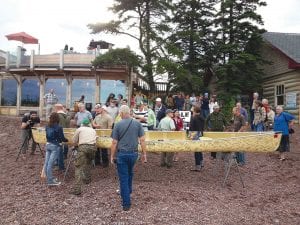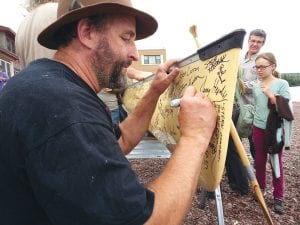Quite a few people turned out to meet and greet Dave and Amy Freeman of Lutsen when they boated into Grand Marais and hosted a pizza party at Sydney’s Frozen Custard and Wood Fired Pizza Tuesday. Leaving from Ely 10 days earlier, the Freemans are spending 100 days paddling and sailing to Washington, D.C. gathering names on a petition that calls for a ban on sulfide-producing mining in Northeastern Minnesota.

With 10 days down and “only” 90 days to go, their sailboat glistening in the sun like a beacon of hope about 300 yards off shore, their pale yellow Wenonah canoe perched on metal horses on the rocky Lake Superior beach looking as much like a piece of art as a vessel that will carry them nearly 2,000 miles to Washington, D.C., and their canoe filled inside and outside with signatures and squiggles of hundreds of well wishers and concerned citizens, Dave and Amy Freeman stopped in Grand Marais on their Paddle to D.C.: A Quest for Clean Water.
The Lutsen couple paused for some much needed rest, good food, a few well earned hugs and then met with a large group of people to discuss their concerns about proposed non-ferrous metals mining on the Iron Range.
Sydney’s Frozen Custard and Wood Fired Pizza, a very busy bustling place on September 2, was the site of Freemans’ stop. The event was also a celebration of the 50th anniversary of the signing of the 1964 Wilderness Act.

Marco Good put his signature on the Freemans’ canoe. The Freemans hope to give the canoe to the president when they arrive in Washington, D.C., as a powerful symbol of their petition against sulfide-producing mining.
The 2014 National Geographic Adventurers of the Year are no strangers to long wilderness trips, just recently finishing a three-year 11,700-mile trip across North America where they paddled canoes and kayaks and met online with more than 100,000 elementary and high school students through their free Wilderness Classroom.
But this trip is different. Dave and Amy, both outstanding outdoor educators, are worried that the proposed Twin Metals and Polymet mines on the Iron Range will produce sulfide which could leach into the ground water, rivers, lakes and streams and could kill plants, fish, and animals.
Dave Freeman noted that iron mining and sulfide mining are as different as apples and oranges. They aren’t protesting all mining, he said, just mines that produce sulfide.
Dave said the couple learned several years ago about the dangers of mines that dig into sulfur-bearing material. He said when rain or other water reaches that material it causes it to become toxic. Should that contaminated water escape into a river or lake, it would cause a lot of damage and be very hard, if not impossible to clean up.
Although Polymet is further along in the permit-tomine process, Twin Metals, which is test drilling a quarter of a mile away from the Boundary Waters Canoe Area Wilderness (BWCAW), is also a major concern for the Freemans.
“Amy and I don’t think that sulfide mining is appropriate on the edge of the BWCAW,” Dave said, citing long term effects of sulfide mining and the negative environmental impact these mines have had on the areas surrounding them.
If mining is allowed, the Freemans worry that the runoff from Twin Metals would flow into and contaminate the Boundary Waters and Canada’s Quetico Provincial Park, the Voyageurs National Park, and would eventually runoff into Hudson Bay.
So the Freemans are carrying their message to anyone who will listen. “We have 10 organized events right now, but we would like to add 30 more,” said Dave.
The Freemans left Ely on Saturday, August 24, and paddled the Voyageur’s route to Lake Superior. “The (8-mile) Grand Portage was really hard on us,” Dave said.
From Grand Marais the couple will sail to Duluth, then along the south shore of Lake Superior, crossing into Canada at Sault St. Marie to sail to Lake Huron, switching back to the canoe (which they will be towing), and paddling the French, Mattawa and Ottawa rivers, delivering their message to the Canadian government in Ottawa before making their way to Montreal. From there Amy said they will paddle to Lake Champlain to Hudson River to New York City, eventually heading through the canals to Chesapeake Bay and on to Washington, D.C.
The plan, said Dave, is to deliver the canoe to the White House and the president. “If that doesn’t work, maybe we will give it to the Smithsonian Institute. We want to find someplace that wants it. Were not sure right now where it will go.”
Should the couple finish on time, they may have a chance to meet with some congressional representatives before Congress takes its holiday break.
By then Dave and Amy’s canoe should be awash in signatures of concerned citizens. They will also have collected thousands of signatures submitted online that they plan to share with the White House and Congress.
“Our jobs and our way of life are at risk,” said Dave, “and we are fighting back the only way we know how.”


Loading Comments